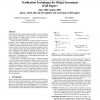Free Online Productivity Tools
i2Speak
i2Symbol
i2OCR
iTex2Img
iWeb2Print
iWeb2Shot
i2Type
iPdf2Split
iPdf2Merge
i2Bopomofo
i2Arabic
i2Style
i2Image
i2PDF
iLatex2Rtf
Sci2ools
115
click to vote
ECOOP
2008
Springer
2008
Springer
A Unified Framework for Verification Techniques for Object Invariants
Verification of object-oriented programs relies on object invariants which express consistency criteria of objects. The semantics of object invariants is subtle, mainly because of call-backs, multiobject invariants, and subclassing. Several verification techniques for object invariants have been proposed. These techniques are complex and differ in restrictions on programs (e.g., which fields can be updated), restrictions on invariants (what an invariant may refer to), use of advanced type systems (such as Universe types or ownership), meaning of invariants (in which execution states are invariants assumed to hold), and proof obligations (when should an invariant be proven). As a result, it is difficult to understand whether/why these techniques are sound, whether/why they are modular, and to compare their expressiveness. This general lack of understanding also hampers the development of new approaches. In this paper, we develop and formalise a unified framework to describe verificatio...
ECOOP 2008 | Object Invariants | Programming Languages | Several Verification Techniques | Verification Techniques |
Related Content
| Added | 19 Oct 2010 |
| Updated | 19 Oct 2010 |
| Type | Conference |
| Year | 2008 |
| Where | ECOOP |
| Authors | Sophia Drossopoulou, Adrian Francalanza, Peter Müller, Alexander J. Summers |
Comments (0)

